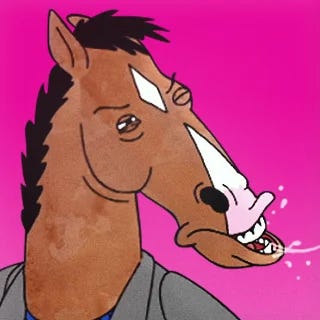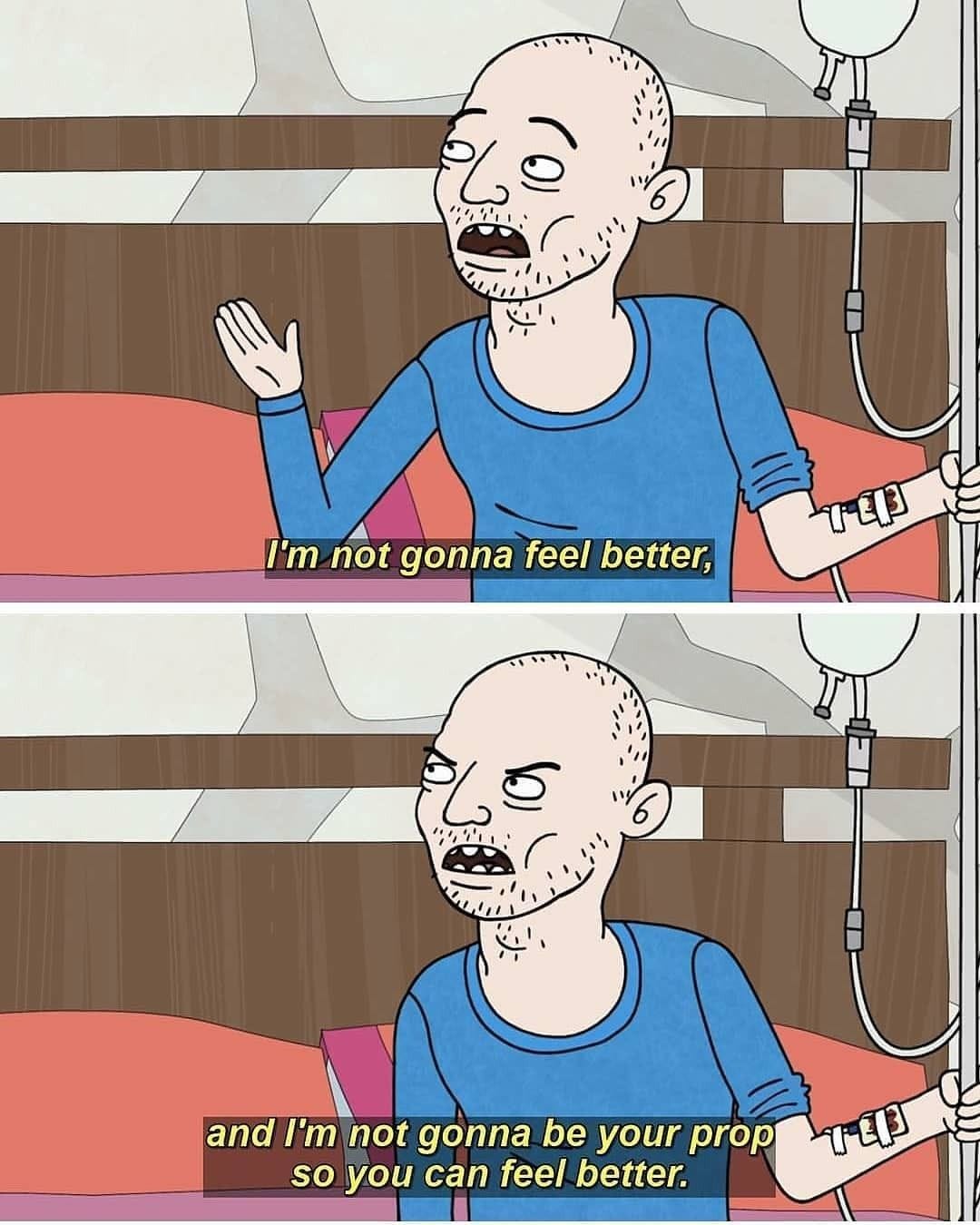“The Telescope,” which is episode 8 of season 1 of BoJack Horseman, is where the series really shows its cards. Some will say this is where it gets good, and while the episode is definitely the best one at this point in the season, I don’t like to say that it’s where the show improves, because there is so much groundwork laid in the first 7 episodes that I can’t call them bad. But there is no question that when we get to episode 8, we have a clear picture about how this show is going to move forward.
We meet Herb Kazzaz (voiced by the incomparable Stanley Tucci) in episode 4 in a flashback to BoJack’s time working on Horsin’ Around. Herb gives struggling stand-up BoJack some advice on his set. We know that Herb was the creator and head writer for Horsin’ Around and that at some point they stopped being friends. When Sarah Lynn tells BoJack that Herb has cancer in episode 3, this is news to BoJack, telling us that they don’t keep in touch at all. But in episode 7, BoJack decides that he needs to go see Herb before he dies so they can try to bury the hatchet.
Episode 8 starts with a flashback to the 80’s where we see Herb bringing in execs from ABC to hear a pitch for his show. Later, he gives BoJack a telescope and invites him to look at the city and tells him that the two of them are going to own the town. He got an offer and made them agree to bring BoJack on as the titular horse in his show. In the excitement of the moment, Herb kisses BoJack, showing us that there’s something more to Herb than we knew.
We then flash to the 90’s when they are in the thick of the show and it’s clear that BoJack and Herb are struggling to remain friends. News has broken that Herb was arrested for lewd behavior with another man and the execs want to fire him. He asks BoJack to try to save him and BoJack agrees, but when Angela Diaz (voiced by Angelica Huston) tells BoJack that he’ll be throwing away his career to support Herb, BoJack reneges on his promise.
We come back to the present, and BoJack, Diane, and Todd pull up to Herb’s house in Malibu. Herb greets them with a series of cutting jokes and there is obvious discomfort all around. When Diane is able to get them both talking about the absurdity of a VitaMix, they fall into a more familiar kind of repartee. They talk about what has been going on in Herb’s life over the past 20 years and at the end of their visit, Herb tells BoJack that it was nice to see him.
As BoJack is leaving, he tells Diane that it feels wrong to go without acknowledging what happened 20 years ago, so he returns to apologize. He makes his apology and Herb refuses to forgive him. They fight verbally and then physically, breaking the telescope that they had used decades earlier to celebrate their success.
“You know what your problem is? You want to think of yourself as the good guy. Well, I know you better than anyone, and I can tell you that you're not. In fact, you’d probably sleep a lot better at night if you just admitted to yourself that you’re a selfish goddamn coward who just takes whatever he wants and doesn’t give a shit about who he hurts. That’s you. That’s BoJack Horseman.” ~Herb KazzazFirst off, this episode has some of the best jokes in season 1. I love the puns in “BoJack Hates the Troops,” but this one goes really hard with the jokes. The Todd B-plot isn’t amazing, but even in that, there are some solid jokes. And the 80’s and 90’s theme songs are just spectacular (see above).
But despite the relentless onslaught of jokes, this is a gut punch of an episode. For the first seven episodes, we see BoJack’s selfishness on display, but no one calls him on it. People might question if what he’s doing is good, but when he does it anyway, no one challenges him further. So to see someone who was a close friend of BoJack just utterly destroy him is shocking.
This episode is also the first time that the writers drop a “fuck.” Because this was a Netflix show, there was nothing stopping them from using whatever profanity they wanted in the show, but the writers chose to use only one f-bomb per season, and it always shows up at an irrevocable breaking of a relationship with BoJack. I am not a prude when it comes to language, but every time that word is used on this show, I flinch because of how intentionally the writers used it.
But the part that always gives me pause with this episode is with regard to the issue of forgiveness. I grew up in a Christian tradition, and I frequently heard the passage where Peter asks Jesus how many times they should forgive people. He suggests seven times and Jesus comes back and says, “I tell you, not seven times, but seventy-seven times.” (Matthew 18:21-22)
The idea was that there was no limit to the number of times one is to offer forgiveness. And as much as I appreciate the role of forgiveness, I also wonder if sometimes Herb’s response to BoJack isn’t the correct one. Here’s a snippet of the conversation between them.
BoJack Horseman : Hey, I wanted to talk to you about... You know, I... feel bad, about what happened.Herb Kazzaz : So, you're apologizing.BoJack Horseman : Yeah, I'm sorry.Herb Kazzaz : Okay, I don't forgive you.BoJack Horseman : Herb, I said I'm sorry.Herb Kazzaz : Yeah, and I do not forgive you.BoJack Horseman : Uugh! Not sure you get what's happening here. This could be the last time...Herb Kazzaz : No, I'm not going to give you closure. You don't get that. [coughs] You have to live the shitty thing, you did, for the rest of your life. You have to know that it's never ever going to be okay.BoJack Horseman : I really think that we'd both feel better if we...Herb Kazzaz : I'm dying. I'm not gonna feel better. And I'm not gonna be your prop so you can feel better.It’s that last line that resonates with me. I think about pastors who are credibly accused of sexual abuse who are restored to their pastorate, sometimes to the applause of their congregation and it feels like theses shows of forgiveness forget that a person was the victim of abuse. How does hearing hundreds (thousands?) of people clapping for your abuser feel? Does that display of forgiveness help in your healing? When pleas for forgiveness are used to avoid accountability, is it appropriate to offer that absolution? And how do any of those questions square with what seems like a pretty straightforward command to forgive generously?
I think the first thing is that forgiveness can only be offered (or withheld) by the person who was wronged. The people in the churches cited above aren’t the people who were wronged. They may be affected by a pastor’s abusive behavior, but they are not the people in the position to offer forgiveness for the abuse.
It doesn’t just happen in churches. We see the same thing with celebrities. I think about Louis CK. He made an apology (kind of) to The World, took some time away and then felt forgiven enough to come back to stand-up. Did he apologize to the women he exposed himself to? Did he apologize to the people who lost work because of his actions coming to light? Or did he just apologize to people who didn’t have any skin in the game apart from just…liking his bits?
Unfortunately what we see in high profile cases like this is a desire to feel better rather than to actually make things right. There are frequent complaints about “cancel culture,” but if one is genuinely sorry, won’t the forgiveness of the person they hurt be sufficient? As Herb says, is it really our place to serve as a prop so someone else can feel better without actually doing anything to right their wrongs?
I have been in a position to need forgiveness and sometimes it does feel good to get that from people who aren’t in a position to offer forgiveness. It makes you feel like you’ve done something, but the truth is, it only matters if you approach the people who you hurt and then make an effort to right those wrongs. And being forgiven by the person who has the right to offer that absolution is ultimately better than the simple choice to get it from those who are quick to offer it.
BoJack did at least go to Herb directly. But ultimately, I think Herb had him pegged. This wasn’t about making things right, it was about assuaging guilt. It was about making Herb work to help BoJack feel better about himself, not to actually make things right with Herb. There wasn’t contrition, there was only shame. And that wasn’t enough to make Herb want to offer forgiveness.
This episode makes me wonder if we would be better served by withholding forgiveness, at the very least from those we don’t have the right to forgive. Instead of rushing to create that sense of safety and comfort, perhaps we could encourage people to figure out how to make things right with their actual victims. And to seek that forgiveness not so they can feel better, but so their victim feels better.
And then to recognize that sometimes, nobody gets to feel better.








Wow! Makes me want to watch this show!